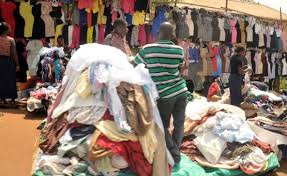

The Mitumba Association of Kenya has made an urgent plea to the Ministry of Industrialization, Trade and Enterprise Development to publish the protocols for the resumption of importation and sale of imported used or secondhand clothes as directed by the president.
The president directed that protocols should be established to lift the ban on secondhand clothes imports three weeks ago.
President Uhuru Kenyatta asked the Cabinet Secretary, Betty Maina, in consultation with the Ministry of Health and representatives of the Mitumba traders to establish acceptable protocols geared towards lifting the ban on the importation of secondhand clothes and footwear.
The association that represents nearly 2 million players in the Mitumba industry has stated that the delay by the ministry continues to impact the livelihoods of Kenyans negatively.
According to the association’s chairperson, Teresia Njenga, the industry players had submitted a proposal to the ministry a month before the president’s directive as part of an agreement with the ministry.
Teresia said that when the president issued the directive during his 9th state address on the COVID-19 pandemic on July 6th, they had extended their appreciation to the Head of State and hoped that the ministry would move speedily.
Weeks after, more traders have lost their livelihoods as others are faced with hard choices. Approximately 35,000 traders, players and linked sectors have been deprived of their livelihoods as stocks get depleted. This is despite the fact that the World Health Organization (WHO) has not prohibited the movement of goods or commodities as a measure to contain the Covid-19 pandemic.
According to the Kenya National Bureau of Statistics and Manpower survey, the popular Mitumba traders fall under the secondhand clothes and footwear industry which employs an estimated 10 per cent of the extended labour force. The total extended labour force based on Labour Force Survey Report in 2020 is 20,641,175.
It is therefore estimated that the trade in secondhand clothes and footwear employs 2,000,000 Kenyans. In a letter addressed to the minister, the association pointed at the extremity of the situation and reiterated its previous commitment to collaborate with the ministry as it plays its trade facilitation mandate.
The guidelines developed and submitted in early June by the association is to enhance the health protocols effected at countries of origin and introduce additional health clearance measures upon arrival. Equally, the guidelines provide detailed workplace protocols for traders, the majority of whom operate in open-air markets across the country.
more recommended stories
 Somalia’s Secretive Oil Deal with Turkey Sparks Outrage, Deepens Political and Security Concerns
Somalia’s Secretive Oil Deal with Turkey Sparks Outrage, Deepens Political and Security ConcernsMogadishu – Somalia’s parliamentary Natural Resources.
 Power Monopoly Sparks Backlash in Burao as Government Sends Mixed Signals
Power Monopoly Sparks Backlash in Burao as Government Sends Mixed SignalsConflicting Government Letters Deepen Burao Electricity.
 Khaatumo Confirms: Al-Shabaab Behind Assassination of Ethiopian Diplomat
Khaatumo Confirms: Al-Shabaab Behind Assassination of Ethiopian DiplomatLaascaanood, SOOL – The already fragile.
 Somaliland President Prioritizes Peace and Security in Landmark Parliamentary Speech
Somaliland President Prioritizes Peace and Security in Landmark Parliamentary SpeechPresident Irro’s address reflects his administration’s.

